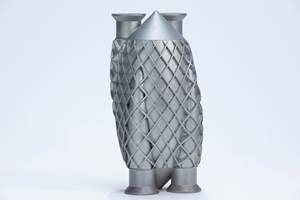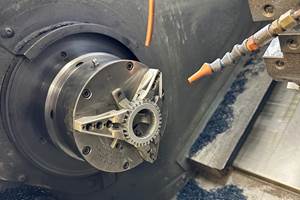Your Shop, Too, Will Have a 3D Printer
In the future, we will take it for granted that a small 3D printer is among the resources routinely used by machining job shops.
Share





“3D printer” describes a range of devices. The term sometimes gets applied to machines that make production parts or tooling from metal powder. (See examples here and here.) Since machines making parts like these don’t even resemble a printer, I am not sure about this use of the term. The term seems more fitting when applied to less expensive machines making polymer parts, particularly desktop machines. In any case, all these devices have a future in manufacturing. The metal systems will increasingly be used to make near-net-shape industrial parts—and that will be interesting. But for a moment, I would like to consider the lower end of the scale. In the future, I think practically every machining business will have some sort of low-cost 3D printer. That is, I think we will one day take it for granted that the typical job shop has at least a desktop 3D printer, and routinely uses it as a complement to its CNC machine tools.
Part of the reason I think this is anecdotal. The recurring theme I hear in job shops’ testimonies about their 3D printers is that they were surprised to discover how useful these devices proved to be. But the other part of my reasoning is the basis I see for this usefulness. A 3D printer and a machine tool make such good partners because the former fills a role the other can’t fill efficiently.
That role has to do with the fact that not every item made in a machine shop is a production part. Some items are created for internal use, and some are made for communication with the customer. In a job shop, it would be great if every piece produced was fully and directly billable, but that’s not reality. The additional items that are necessary get made on the very same machine tools that run production, because in a small shop, what other choice is there?
Answer: The 3D printer can be the other choice. In a job shop, this device can make some of those parts that the more valuable CNC machine tools should not be spending time on. Indeed, this device makes parts the valuable employees shouldn’t spend so much time on, either.
Prototypes are perhaps the beginning of this. For the small shop, how many jobs begin as “napkin drawings” or similar rough sketches? In each of these cases, a prototype has to be made first, if not a series of prototypes, just to reveal to both the customer and the shop where the rough sketch falls short. On the machine tool, the cost of making each of these unique prototypes includes not only the machine time but also setup. Or, seemingly a much better alternative is to let the 3D printer run through the night to generate this piece. The prototype made this way would convey the part’s form, and depending on the application, it might even stand in to serve the part’s function.
Tooling comes next. For any given job, custom tooling might be needed either to fixture the part effectively or to inspect it. Making this tool prior to production is a sound investment, because an effective tool will speed the job. But 3D printing can reduce the cost of that investment. Indeed, a 3D printer can allow the shop to generate this custom tool in the very same office where the tool is designed.
Then there are the projects so small and seemingly fussy that no shop would imagine devoting CNC machine time to them. The 3D printer makes it possible to playfully invent solutions to the problems these projects represent. For example, how much better would parts from the lathe stack up if the chute delivering them could curve at a better angle? How much simpler would a given setup be if a custom rack arranged the required hand tools in the right sequence? And what common errors or safety hazards could be avoided with a small, custom 3D-printed cap or barrier to block the mistake or cover the injury point? Solve enough little problems and the cumulative effect is large. In fact, that’s the frequent observation I hear from shops using 3D printers: They didn’t appreciate how many of these little problems there were to solve until they had a reason to start seeing them.
Not just any 3D printer will do. “Low cost” shouldn’t mean inadequate. An inexpensive 3D printer that is too light on capability might prove frustrating when used in an industrial context. But even so, the printer that can deliver all of the benefits above is liable to cost much less than the least expensive production CNC machine in the shop. And 3D printers at higher levels of capability that this could also be used as resources to make production parts.
Our Additive Manufacturing website covers 3D printing technology at all of these levels, including the level of small printers used in small shops. On that site, we have assembled collections of articles related to tooling, functional prototypes and the use of 3D printers in job shops. Find links to all those collections.
Related Content
The Cool Parts Showcase Seeks Innovative 3D Printed Parts
Do you solve problems with 3D printing? Enter your 3D printed parts in this contest from The Cool Parts Show.
Read MoreJTEKT Technology Days Showcases Synergies
The event took place following the company’s completion of its new showroom and decision to merge several of its brands under the JTEKT name.
Read MoreHow to Meet Aerospace’s Material Challenges and More at IMTS
Succeeding in aerospace manufacturing requires high-performing processes paired with high-performance machine tools. IMTS can help you find both.
Read MoreChuck Jaws Achieve 77% Weight Reduction Through 3D Printing
Alpha Precision Group (APG) has developed an innovative workholding design for faster spindle speeds through sinter-based additive manufacturing.
Read MoreRead Next
Setting Up the Building Blocks for a Digital Factory
Woodward Inc. spent over a year developing an API to connect machines to its digital factory. Caron Engineering’s MiConnect has cut most of this process while also granting the shop greater access to machine information.
Read More5 Rules of Thumb for Buying CNC Machine Tools
Use these tips to carefully plan your machine tool purchases and to avoid regretting your decision later.
Read MoreRegistration Now Open for the Precision Machining Technology Show (PMTS) 2025
The precision machining industry’s premier event returns to Cleveland, OH, April 1-3.
Read More

















.jpg;maxWidth=300;quality=90)













